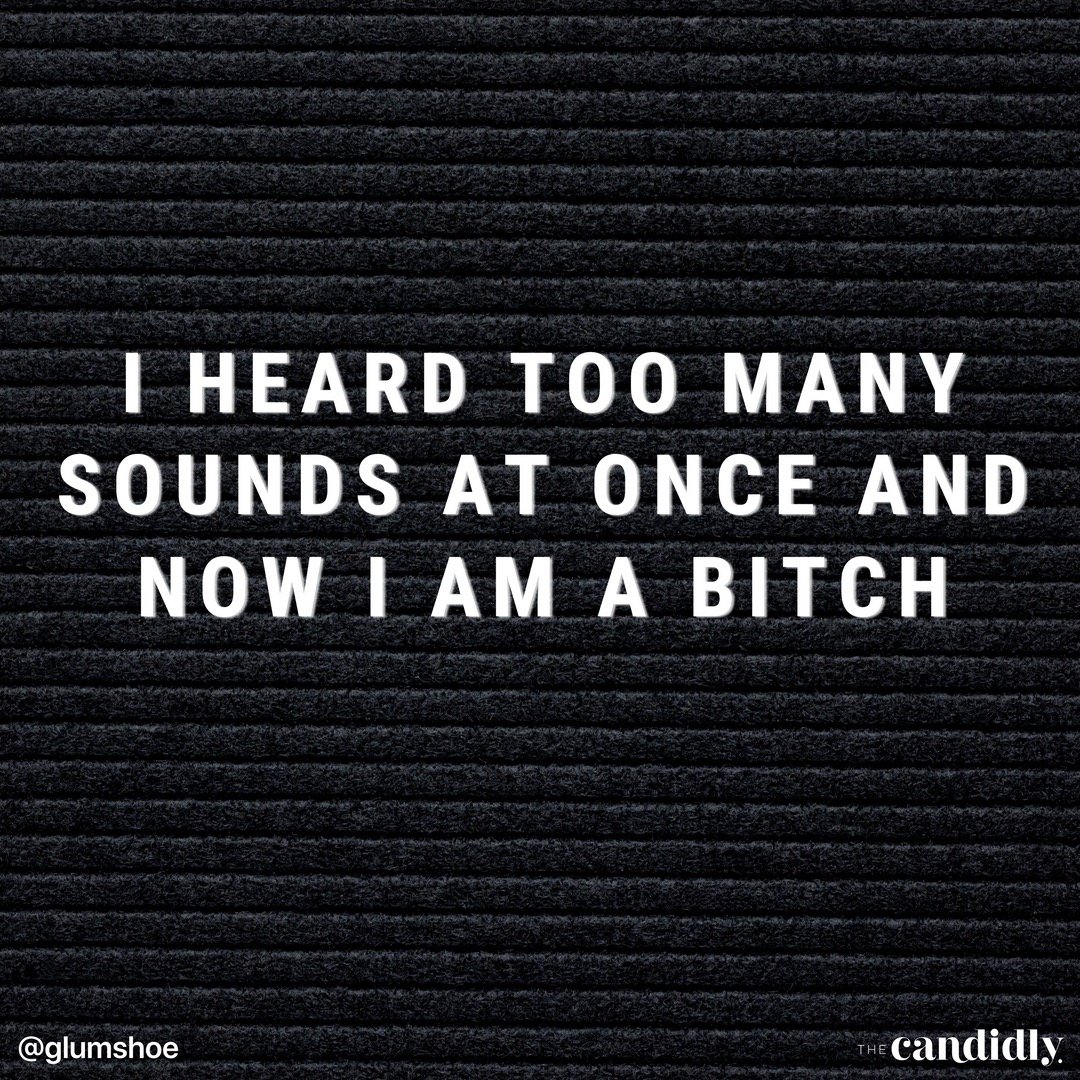Misophonic Spree: My Life With Misophonia
by Nicole Pirshafiey
Have you ever wanted to slice your ears off at the sound of someone’s chewing? Have you ever wanted to throw yourself into a well rather than sit next to someone breathing noisily? Have you ever found yourself tumbling into a black hole of rage when someone bites their metal fork at a dinner party?
Then you, my friend, are not alone. And you probably (definitely) have misophonia.
Miso what?
Unfortunately, the miso I’ll be writing about is not a delicious soup. The “miso” I’m referring to is the Greek for “hatred.” And “phonia” translates to voice, or sound. So having misophonia means you have a “hatred of sound.” Which, if you have it, probably feels like the understatement of the century.
I would call it more “an attack on my very being.”
The clinical definition of misophonia is when “auditory stimuli provoke a neurophysiological response with accompanying negative emotions, cognitions and behavior” according to Dr. Jennifer Brout, founder of the Sensory Processing and Emotion Regulation Program at Duke University. Common triggers for misophonia often include “mouth noises” (that phrase alone makes me want to fly into the sun) like chewing, breathing, and slurping, but also includes tapping and scratching sounds.
And honestly, just writing that list of horrors made my skin crawl off my body and into my nightstand to find my noise-canceling ear plugs.
Previously, this condition has gone by a few other names: soft sound sensitivity symptom, select sound sensitivity syndrome (also called 4S), decreased sound tolerance, and sound-rage.
Can we stop for a moment to discuss SOUND-RAGE? Now we’re cooking with fire! Miss me with “hatred of sound,” I 100% can get behind telling people they give me SOUND-RAGE. I would do a *chef kiss* to that phrase but I don’t want to smack my lips and set myself off.
Regardless of what we call it, the origin of this diagnosis is surprisingly recent! The term misophonia was coined by Jastreboff and Jastreboff in 2001. Which was four years after I realized that sounds were…more difficult for me than others. While I can’t recall the first time that I realized sounds bothered me, I do remember the first time it became A Thing.
Fifth grade. Islands Elementary School. We’re learning about marine biology and, for some inexplicable reason, our assignment is to create a boat out of aluminum foil. Ignore, for a moment, the absolutely bonkers stretch that is applying that lesson to this assignment, and imagine instead the aural terrorism that occurred to my young eardrums.
“being trapped in a small classroom with this metallic cacophony made me lose my mind. I can’t even write this without getting chills.”
You know how people talk about having tunnel vision? When I have a spike of misophonia, it feels like tunnel hearing. Everything else fades away, and all I can focus on is the offensive sound. So being trapped in a small classroom with this metallic cacophony made me lose my mind. I can’t even write about this memory without getting chills and feeling the ache in my teeth!
The truth is, I don’t remember what I said to my teacher to ask to be excused, because nothing made sense and my brain hurt. I just remember her fixing me with a strange look and hurrying me out of the classroom, where I sat outside reading a book until the lesson was over. (Which is truly the dream, and in retrospect I can’t believe I never tried to get excused again to go outside and read in peace.)
But in researching this article, I came across an interesting fact: according to Harvard Medical School, “misophonia usually appears around age 12.” I was 11 when this classroom horror occurred, which seems to be an interesting anecdotal validation of the data, wouldn’t you say?
It wasn’t just at school, though. Please. It was, and is, everywhere. Name a category, and I can give you an example of how this has plagued me.
Family? Trust me when I tell you that when I eat dinner with my father, I hear the Kill Bill sirens in my head. Don’t get me started on when my mom uses her long nails to scratch her dry arms and legs and scalp. I would rather listen to a metal alarm clock in a garbage disposal for the rest of my life than ever hear her do that again.
Romance? Look, my husband is asthmatic. There are wheezes and squeaks that he medically, biologically cannot suppress. Nor can I suppress my rage at them. So buying a sound machine to block out what I not-lovingly refer to as his “night wheezes” is the best act of self-care I have ever engaged in. See also: wow, when my husband bites his metal fork while taking a bite, I am not exaggerating when I say I want to rip the fork out of his mouth and stab him with it.
Work? Allow me to tell you about the silent, unspeakable rage of having to sit near a gumsmacker in a meeting, knowing that I am a professional and that it would likely affect my “growth opportunities” if I don’t find a way to dissociate.
Social media? HA, you thought you stumped me with this one because most people scroll through their feeds with sound off, didn’t you! Well, the joke’s on you, because I WORK in social media. Which means that I have to keep up with internet trends, and let me tell you - MUKBANG videos can fuck right off. Even The Hot Ones series—which I love!—are so hard for me to actually sit through. Thank God for closed captioning. Which actually I still sometimes gag from, depending on how descriptive they are.
What about generally noisy public areas? Surely I can put it away when in a crowd and other people’s noises are inescapable?
No I can’t!
I have a reputation for being confrontational, and let me tell you—nothing brings out my truculence like being at the movie theater. I would very much like to meet the Eldritch horror who decided popcorn was the go-to snack at the cinema. Moviegoing is a sacred, silent experience to me. If someone is talking or playing on their phone or taking 300 years to open their fucking Red Vines, I cannot focus on the movie AT ALL. I have gotten into far too many altercations at the theater because of this.
So, obviously, this has just been part of my life for as long as I can remember.
I’m reminded of the fact that I grew up thinking kiwis were supposed to make your mouth itchy and your tongue burn. I…guess I figured it was part of the appeal? I was well into my twenties when I realized I actually had an allergy to tropical fruit and that no, most people did not eat kiwis for that sweet tingling sensation. It made me feel foolish, sure, but it also provided an explanation as to why I was putting up with something unpleasant because I thought it was normal. What a convenient anecdote!
“realizing I wasn’t alone in wanting to punch my sister in the mouth every time she crunched on ice was a major sanity check.”
Needless to say, finding out there was a name for this whole thing was quite the discovery.
Realizing I wasn’t alone in finding kiwi painful to eat and realizing I wasn’t alone in wanting to punch my sister in the mouth every time she crunched on ice were both major sanity checks for me. I can’t help but pull a Tobias Funke and exclaim “there are dozens of us!” when challenged for my noise sensitivities.
Truth be told, there’s no known number of sufferers (ew), but multiple online support groups are numbered in the thousands. Fun fact: there is an entire Misophonia Institute dedicated to the study and support of those afflicted (ew ew ew) with the condition. And guess what? We sound-sensitive folks are in your real life, too!
This entire article actually came about while I was commiserating with the editor-in-chief of this very site, who also “suffers” from misophonia. I asked her what sets off, and WOW does this resonate:
“My husband’s BOOMING voice that booms ever more when accompanied by topics that he experiences particular rage over. Additionally, children’s high-pitched whining especially when there’s a nasal quality involved, a louder-than-necessary TV with no one watching it, a louder-than-necessary TV with people watching it, the deafening assault of any ‘four quadrant’ movies at the movie theater, the sound of any laughter emanating from someone’s own joke, the bashing/murdery parts of any video game, tapping incorrect rhythms to music. I’m fun to live with.”
As the kids say: BIG SAME.
And as my Aunt Elena told me (name changed to protect the… innocent), “You know honey, I get so angry at these sounds that I get worked up…down there.” Clearly, we all have our own manifestations of the adrenaline rush that comes with being furious.
Truth be told, of all these anecdotes and shared experiences, you know what I find the most curious? Clearly, this is a real thing that many people deal with. Clearly, I have it. But…I haven’t done anything about it.
Why is that?
Well, for me personally, it feels weirdly “small” to get help for something like this. I have so much other ~baggage~ that it seems low on my list of priorities. But I have an extremely hard time focusing when one of my trigger sounds is occurring.
And it’s not just me.
So why don’t more seek help for this condition? Well, according to Harvard Medical School, “people who have misophonia often feel embarrassed and don’t mention it to healthcare providers — and often healthcare providers haven’t heard of it anyway. Nonetheless, misophonia is a real disorder and one that seriously compromises functioning, socializing, and ultimately mental health.”
And then there’s the fear of being dismissed by a doctor or therapist, which is not unfounded, according to Dr. Brout: “members of the medical community often regard these disorders as ‘unreal’ because descriptions of them have been haphazardly built out of ambiguous bits of information that ultimately don’t add up to anything grounded in theory. I like to call this process the ‘dominos of disbelief.’ Misophonia is a very real condition that has unfortunately fallen victim to this phenomenon.”
The science backs this up.
According to the New York Times, Dr. Sukhbinder Kumar, the lead researcher from the Institute of Neuroscience at Newcastle University, says that “brain scans of misophonia sufferers show that particular sounds, like eating and drinking, cause the part of their brain that processes emotions, the anterior insular cortex, to go into overdrive…that region in sufferers was also connected differently, compared to normal brains, to the amygdala and the hippocampus, areas that are involved in recalling past experiences.”
And Harvard Medical School shares even more detailed explanations of the biology and neurology of misophonia: “the parts of the brain responsible for long-term memories, fear, and other emotions were activated. This makes sense, since people with misophonia have strong emotional reactions to common sounds; more importantly, it demonstrates that these parts of the brain are the ones responsible for the experience of misophonia.”
And, according to 23andMe, this could actually be an inherited set of neurological reactions: “23andMe researchers have identified one genetic marker associated with feeling rage at the sound of other people chewing. This genetic marker is located near the TENM2 gene, which is involved in brain development.”
So this living daily nightmare might be genetic?
I have to tell you, I’m laughing so hard at the idea of my ancient ancestor who passed this gene down, sitting off by themselves to eat their leaves and berries while their noisy cavemates chowed down loudly around the fire.
But it leads me to yet another question…is it fully nature? Or is any of this condition nurture?
My dad likes to “take credit” for my misophonia because A) he is a textbook narcissist and cannot process information about others without making him about himself and B) he recalls often how he used to shame me for eating too loudly as a little girl (which is rich because he eats like Denethor and he knows it). And going back to that New York Times article, Dr. Kumar states that “we think that misophonia may be heavily connected to recalling past memories, because people with misophonia have had very bad experiences.” Is there a commonality of awful childhood or adolescences in those who have misophonia?
Well, for me, this mayyy be the case. A childhood full of conditional love and performative antics, with a retreat into books and musicals and the oldies station on the radio (back when they played The Beach Boys, not The Backstreet Boys). So is there a connection? Possibly.
According to Landmark Hearing, “it typically begins with a sudden onset after some emotionally significant event associated with exposure to a first trigger sound, activating a strong emotional and behavioral reaction.” Interestingly, I moved three times in 4th grade and went through what I retroactively can identify as my first depressive episode. I have no particular “emotionally significant event” that I can connect to an initial trigger sound, but I can’t say with any certainty that there wasn’t a specific event.
“in my own experience, the closer I am to someone and the more I trust them, the more their sounds are betrayal to me. ”
Here’s what I can say with some certainty: in my own experience, the closer I am to someone and the more I trust them, the more their sounds are betrayal to me. My husband and my dad are the worst transgressors. They could blink loudly and I would want to die. I am currently hiding in a room in my house where I can’t hear my husband eating pretzel sticks, because the sound feels like he is stabbing me in the brain with an actual stick. I’m not a huge drinker, but whenever I dine with my dad I have at least two cocktails to take the edge off re my aforementioned Denethor reference.
However!
In recent years, an interesting outlier has emerged: my son.
His eating sounds are precious to me. He was also diagnosed with asthma when he was a year old, but his little wheezes never send me into a rage spiral.
They do, however, have me on high alert.
When he was a newborn, I used to have to sleep on the sofa while my husband slept in the bedroom with the baby—he would bring the baby to me every 2-3 hours to nurse because if I slept in the room with him, every smack and and snarfling sound would wake me up and I legitimately could not sleep next to him the first few weeks. (I also had severe postpartum anxiety, which likely went hand in hand with the hypersensitivity to his baby sounds—even if they didn’t send me into a rage blackout). Not that the child is incapable of sending me into a rage with his sounds. His eating and breathing may not bother me the way everyone else’s does, but there is a particular pitch he can achieve while whining that SENDS ME. I’m only human.
Listen. At the end of the day, I don’t feel just ill will against this condition. For one thing, it does make me feel kinda good about myself? I mean, “misophonia and intelligence” is the first suggested search result when Googling misophonia. (Followed by “misophonia and anxiety” which…fair.)
And this got me thinking…does this preconditioned state also make us more apt to enjoy pleasurable sounds? It turns out…maybe! Allergic to Sound has a wonderful interpretation of a Northwestern University study, titled “Study Reveals Misophonia Sufferers May Be More Prone to Creative Genius.” In it, they make a compelling argument: “if funneled in the right direction, these sensitivities can make life more rich and meaningful, giving experiences more subtlety.”
When I asked my fellow…misophonians? Misophonics? Let’s call them “sensitive listeners.” When I asked them about their experiences, it turns out that they also have a similar auditory pleasure that is easier to achieve. Me, personally? I loathe ASMR videos, because of the dreaded mouth noises.
So here’s my hot take: misophonia is a terrible name for what we experience.
We don’t hate all sounds. I think it’s unfair to all the lovely, harmonious sounds out there that bring us such joy, and if I get to have a deeper enjoyment of my collection of windchimes and Hawaiian music, well then, I’ll try not to murder my fork-biting night-wheezing pretzel-chomping husband, who refers to this as my “mesothelioma” article.
And while I do wish there were a class action lawsuit I could join for aural damages, I’ll gladly settle for getting tingly and weepy roughly 213 times with each, successive Hamilton viewing.
If “miso+phonia” is hatred of sound, and the opposite of miso is philo, then I fully have philophonia for Hamilton, and listen—that’s worth dealing with all the excruciating sounds that have ever existed.
Nicole Pirshafiey is a writer, a mom, a Webby Award-winning social media "professional," and a chronic multitasker—never in that order. Her last name is impossible to pronounce. You can find more of her articles here.







